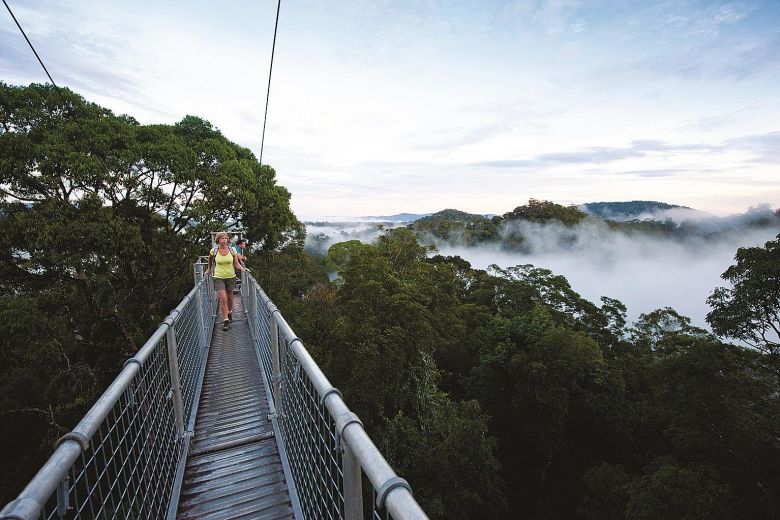
Hiking is one of the popular activities in Brunei. More than 70 per cent of the land is covered by lush rainforests.PHOTO: TOURISM DEVELOPMENT DEPARTMENT OF THE BRUNEI MINISTRY OF PRIMARY RESOURCES AND TOURISM
Scenes of divers plunging into the sea to examine the wreckage of historic sunken ships and images of families riding on a flying fox over lush rainforest feature prominently in new Brunei tourism videos to lure more international visitors, as the sultanate seeks to grow the sector against the backdrop of low global oil prices.
The government hopes to double air arrivals from 218,000 in 2015 to 451,000 by 2020. It is keen to raise the sector’s revenue contribution of B$178.6 million (S$178.6 million, US$130.1 million), or 1.1 percent of the gross domestic product (GDP) last year, to 3 percent in “incremental” stages, a senior tourism official told The Straits Times.
“Tourism is one of the clusters that we have identified as having the potential to contribute to our country’s economy, which now relies heavily on oil and gas,” Zamree Junaidi, the tourism development department director at the Ministry of Primary Resources and Tourism, said.
Official data shows that gas and oil mining accounted for 41.7 percent of the country’s GDP last year, followed by manufacturing and government services. In a move towards a more diversified and competitive economy, the government has begun to make policy reforms in non-energy sectors, including tourism, halal business, and the technology and creative industry.
The ministry has since late last year begun working with various stakeholders from the public and private sectors to roll out “emerging products”. These include tours to fairly unexplored destinations such as Sungai Basong, a recreation park for picnickers and joggers, and activities like diving to explore shipwrecks and oil rigs, birdwatching and kite-flying, said MZamree.
“What else can we do that’s different? Maybe it’s things we locals do that we take for granted and that we enjoy doing which we now want to introduce as a new tourism destination or package,” he added.
Pilipinas Quising, a senior economics officer from the Asian Development Bank, said there is potential in ecotourism, with activities related to nature, adventure and culture more likely to draw foreign tourists, but this could be hampered by strict Islamic laws and underdevelopment in the retail sector, transport services and entertainment facilities. Brunei started to implement hudud, the strict Islamic penal code, in May 2014.
The tourism sector “will probably remain small” and tourist arrival targets “may be quite a challenge”, she noted. But in the World Economic Forum’s travel and tourism competitiveness report published in April, Brunei ranked among the top 10 fastest-growing destinations for leisure travel from 2016 to 2026, suggesting such “developing and emerging countries are catching up” in improving their competitiveness.
Zamree said Brunei is a treat for nature lovers since more than 70 per cent of the land is covered by pristine rainforests. It is also stable politically, safe from natural disasters and small enough to get around in a few days.
He added that economic gains will not come at the expense of environmental and social values, adding: “We’ll do it step by step. What we have learnt from other countries is that when damage is done to the environment, for example, it’s irreversible.”
Infrastructure is being improved. The 30km Temburong Bridge connecting the urban Bandar Seri Begawan to the forested enclave of Bangar is expected to be completed in 2019.
The sultanate is also open to foreign investment. Zamree said investors from Singapore can propose to develop villas and hotels.
A new 12ha riverfront park which opened last Sunday (Oct 22) had involved infrastructure consultancy firm SMEC, a member of Singapore-based Surbana Jurong. Its chief executive, Andy Goodwin, said: “SMEC is proud to have been involved in the creation of a public recreational space to benefit both the local community and visitors.”